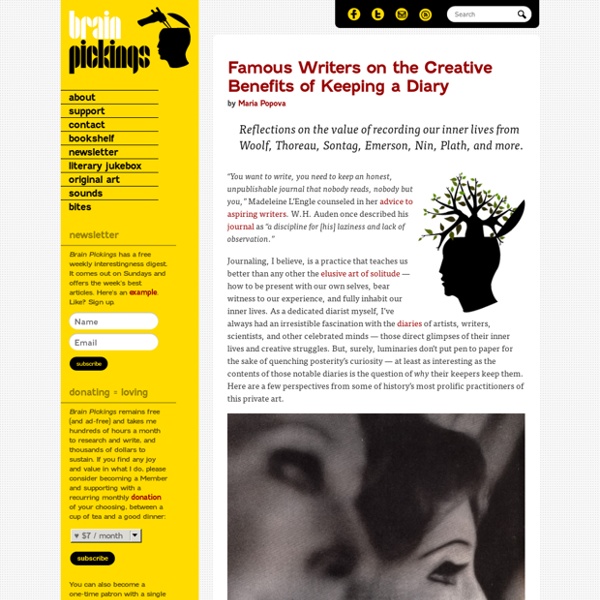Famous Writers on the Creative Benefits of Keeping a Diary

The Daily Routines of Famous Writers
By Maria Popova UPDATE: These daily routines have now been adapted into a labor-of-love visualization of writers’ sleep habits vs. literary productivity. Kurt Vonnegut’s recently published daily routine made we wonder how other beloved writers organized their days. So I pored through various old diaries and interviews — many from the fantastic Paris Review archives — and culled a handful of writing routines from some of my favorite authors. Enjoy. Ray Bradbury, a lifelong proponent of working with joy and an avid champion of public libraries, playfully defies the question of routines in this 2010 interview: My passions drive me to the typewriter every day of my life, and they have driven me there since I was twelve. Joan Didion creates for herself a kind of incubation period for ideas, articulated in this 1968 interview: I need an hour alone before dinner, with a drink, to go over what I’ve done that day. E. I never listen to music when I’m working. Photograph by Tom Palumbo, 1956
Famous Writers’ Sleep Habits vs. Literary Productivity, Visualized
by Maria Popova The early bird gets the Pulitzer … sort of. “In both writing and sleeping,” Stephen King observed in his excellent meditation on the art of “creative sleep” and wakeful dreaming, “we learn to be physically still at the same time we are encouraging our minds to unlock from the humdrum rational thinking of our daytime lives.” Over the years, in my endless fascination with daily routines, I found myself especially intrigued by successful writers’ sleep habits — after all, it’s been argued that “sleep is the best (and easiest) creative aphrodisiac” and science tells us that it impacts everything from our moods to our brain development to our every waking moment. I found myself wondering whether there might be a correlation between sleep habits and literary productivity. The challenge, of course, is that data on each of these variables is hard to find, hard to quantify, or both. Donating = Loving Bringing you (ad-free) Brain Pickings takes hundreds of hours each month.
Creation: Ancient Indian Origin Myths, Brought to Life in a Breathtaking Illustrated Cosmogony
by Maria Popova Consummate visual storytelling about life, death, the rhythms of time, and the beginning of art. “We don’t need to credit an all-seeing God with the creation of life and matter,” Douglas Rushkoff wrote in contemplating consciousness, “to suspect that something wonderfully strange is going on in the dimension we call reality.” Nowhere does this celebration come more vibrantly alive than in Creation (public library) by Bhajju Shyam — the best-known artist of India’s Gond tribe and the talent behind the extraordinary London Jungle Book. Air A master of the traditional folk art style for which his tribe is known, Shyam conveys the core symbols and stories of Gond cosmogony in this simple yet enormously evocative masterpiece of visual storytelling. The Unborn Fish Hand-bound in a limited edition of 5,000 numbered copies and silkscreened on handmade paper with traditional Indian dyes, this beautiful book comes from South Indian independent publisher Tara Books. Death and Rebirth
Related:
Related:



